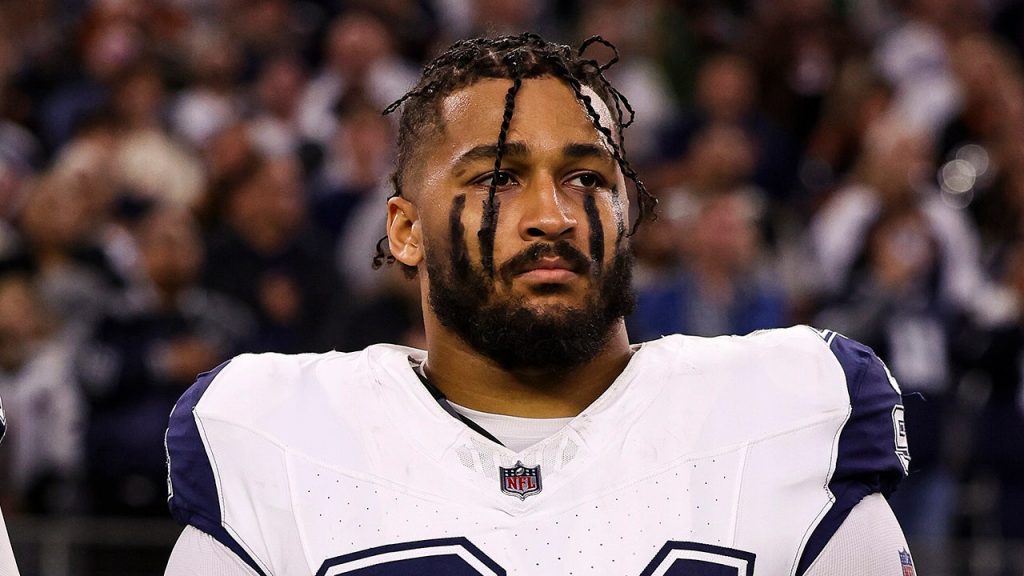The Tragic Loss of Marshawn Kneeland: A Young NFL Star Gone Too Soon
In a devastating turn of events, Dallas Cowboys defensive end Marshawn Kneeland, just 24 years old, died from a self-inflicted gunshot wound following a police chase in Texas on Wednesday night. Texas Department of Public Safety officials revealed that troopers attempted a routine traffic stop around 10:33 p.m., but Kneeland refused to pull over. The ensuing pursuit was eventually called off when officers lost sight of his vehicle. Minutes later, they discovered his abandoned car and initiated a search of the surrounding area, ultimately finding Kneeland deceased around 1:30 a.m. Thursday morning. Frisco police, who assisted in the operation, later disclosed that during their search they learned Kneeland “had expressed suicidal ideations” prior to the incident.
The circumstances surrounding this tragedy paint a heartbreaking picture of a young man in crisis. What began as a traffic stop escalated into a sequence of events that ended with the loss of a promising life. After abandoning his vehicle, Kneeland apparently fled on foot into the darkness, carrying with him whatever private struggles had driven him to such desperation. The Collin County Medical Examiner’s Office will determine the official cause of death, but preliminary findings suggest he died by suicide. For teammates, coaches, and fans who had just celebrated his first NFL touchdown against the Arizona Cardinals days earlier, the news came as a shocking contrast to the on-field success he had recently achieved.
The Dallas Cowboys organization released a statement expressing their profound grief: “It is with extreme sadness that the Dallas Cowboys share that Marshawn Kneeland tragically passed away this morning. Marshawn was a beloved teammate and member of our organization. Our thoughts and prayers regarding Marshawn are with his girlfriend Catalina and his family.” This brief but poignant message reflects the stunned reaction throughout the NFL community, where Kneeland was still establishing himself after being selected 56th overall in the 2024 NFL Draft. The abrupt loss of a young player just beginning his professional career has resonated deeply across the league, reminding everyone of the personal struggles that can exist behind athletic achievement.
Kneeland’s family provided a moving statement that offered glimpses into the person behind the football helmet: “We are devastated by this tremendous loss and are still processing the depth of our grief. As Marshawn was making his mark on the football field with the Dallas Cowboys, he held an even more special place off the field — as a devoted son, brother, uncle, cousin, nephew, grandson, and friend. He was kind, determined, humble, and full of love. His light shone brightly in every life he touched, and his spirit will continue to live on through the countless hearts he inspired.” These words paint a portrait of Kneeland as more than an athlete — he was a multifaceted individual with deep family connections and personal qualities that touched many lives off the field.
The tragic irony of Kneeland’s death occurring just days after a career milestone underscores how professional success doesn’t necessarily translate to personal well-being. Monday night had been a moment of triumph as he recorded his first NFL touchdown against the Cardinals, a achievement that would normally mark the beginning of a promising career. Instead, it became one of his final professional moments. This stark contrast between public achievement and private struggle serves as a sobering reminder that mental health challenges can affect anyone, regardless of their outward success. For many observers, this tragedy has prompted reflection on the pressures faced by young athletes and the importance of mental health support systems in professional sports.
As the football community and Kneeland’s loved ones grapple with this loss, questions inevitably arise about what signs might have been missed and what support might have made a difference. His family has requested privacy during this difficult time as they come together “to honor and remember Marshawn’s life and legacy.” Their plea for space to grieve privately stands in contrast to the public nature of his career and death. For those struggling with similar challenges, resources like the Suicide & Crisis Lifeline (988 or 1-800-273-TALK) remain available around the clock. Kneeland’s tragic story serves as both a heartbreaking loss for those who knew and loved him, and a powerful reminder of the importance of reaching out for help in moments of crisis. Behind every uniform and public persona is a human being navigating the complex terrain of life, sometimes carrying burdens invisible to those around them.


